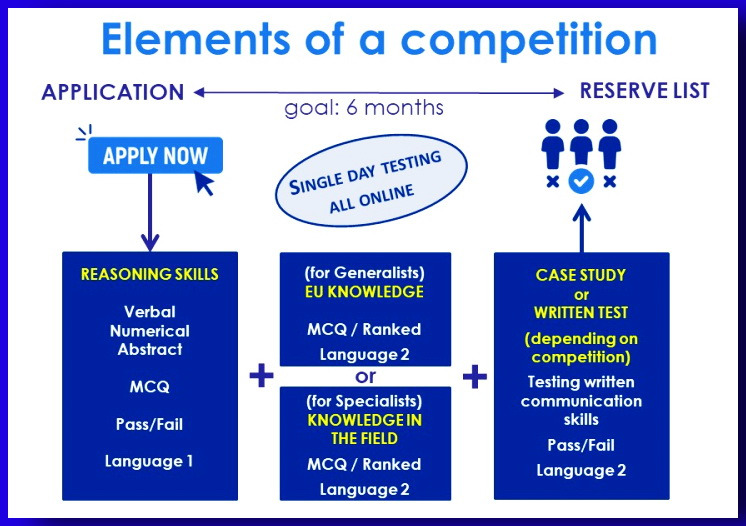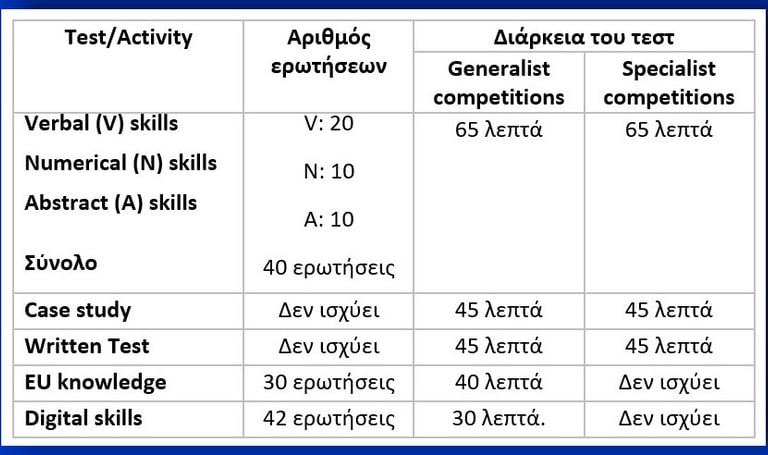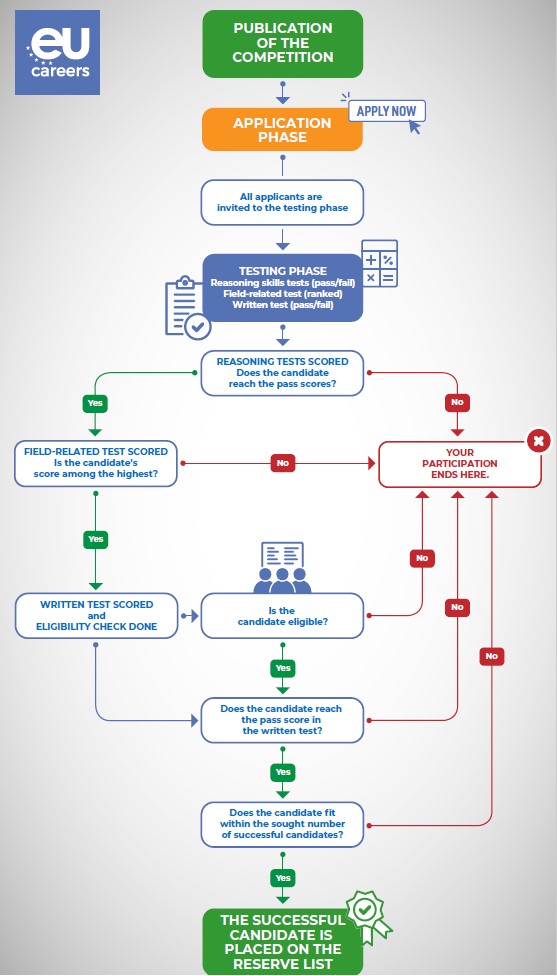Don't Just Test Your Limits — Be Empowered to Crash Them...

Τhe EPSO (European Personnel Selection Office) Τεστ
EPSO Test Explained: Structure and Key Components
EPSO competitions are used by the European Personnel Selection Office as a skill-assessment process for candidates applying to work at the institutions and agencies of the European Union (EU).
Through this examination, the relevant EU bodies can evaluate candidates’ verbal, numerical, and abstract (inductive or diagrammatic) reasoning skills, and assess their suitability for a career within the EU.
The EPSO skills tests consist of general multiple-choice questions. Knowledge-based tests on the EU and interview stages follow—but only for those (on average 20%of total participants) candidates who successfully pass the EPSO skills assessment.
In terms of structure, the EPSO exams are divided into categories with differing content. The official notice of competition for the positions you are interested in—which is published in the Official Journal of the European Union—is the only document that provides detailed and authoritative information on the specific exam. Nevertheless, the following types of exercises are almost always included in the assessments:
EPSO Verbal Reasoning Test: Assesses candidates’ ability to reason logically and to understand verbal information presented either explicitly or implicitly in a written passage.
EPSO Numerical Reasoning Test: Assesses candidates’ ability to comprehend, interpret, and draw conclusions from numerical and quantitative data.
EPSO Abstract Reasoning Test: Assesses candidates’ ability to think logically and identify patterns or relationships between visual elements that are not based on linguistic, spatial, or numerical content.
To tackle effectively the test, be sure to get your copy of our brand-new (2025) book: EPSO Unlocked: Strategy, Substance & Success, a comprehensive guide dedicated to the EPSO selection tests. This is the ultimate preparation tool for navigating the notoriously demanding EU competition exams—a clear and targeted resource packed with proven strategies and high-quality practice material.
Whether you're tackling verbal, numerical, or abstract reasoning—or facing the new written test (WT)—this book equips you with:
Focused theory and illustrative examples for each key component of the exam: verbal, numerical, and abstract reasoning.
Dozens of examples and 180 original, exam-level exercises with detailed explanations—no fluff, no shortcuts.
Strategies for time management, concentration, and performance under pressure.
A hands-on guide to the WT, featuring a realistic prompt, a model answer, and a thorough evaluation based on official assessment criteria.
Exceeding the role of a preparation manual, EPSO Unlocked teaches you the mindset, discipline, and analytical skills needed to succeed in EPSO competitions.
Approach your next exam with clarity, strategy—and purpose.
Effective handling of the written test is thoroughly addressed in our book, accompanied by a detailed presentation of the official assessment criteria applied to your text, as well as a fully developed example with an in-depth explanation of the scoring process, ensuring that you understand not only what to write, but how your writing will be evaluated—so that you can align your strategy with what truly matters.
As of 2024, oral examinations have been discontinued.
The overall examination process, as well as the structure and content of the tests, are illustrated in the two images that follow.






F.A.Q.s for the EPSO exams
The new selection procedures (introduced after 2024) allow candidates to take the tests in any of the EU’s 24 official languages, rather than being restricted to the three dominant languages as in the past.
However, the requirement to use two different languages during the selection process remains in place for each competition.The competitions will be conducted online, in a single day, with participants monitored remotely.
Please ensure that your technical p/c setup is suitable and that you are familiar with the new examination environment.
More detailed test-related information in English can be found at the following address: https://eutraining.eu/content/how-get-epso-cast-job-unravelling-complex-selection-process#
It is estimated that, under the new testing system, competitions will be completed and results published within less than six months.
Each category of questions may require candidates to reach a predefined minimum score threshold, typically 50% or 60% of the maximum score.
Meeting this threshold does not guarantee progression to the next stage, but failing to meet it will result in automatic disqualification.Specifically for the Reasoning Tests, achieving the minimum threshold of 50% is now sufficient to advance to the next phase.
For the Numerical and Abstract Reasoning sections, this threshold is calculated cumulatively. For example, if you score 3/10 in Numerical and 7/10 in Abstract Reasoning, you meet the required condition for these components.
For additional official information regarding EPSO competitions, please visit the following website: https://eu-careers.europa.eu/el/selection-procedure/epso-testsSample questions from the new-style exams for administrative staff can be found here: https://eu-careers.europa.eu/en/administrators-ad-generalists and here: https://eu-careers.europa.eu/en/administrators-ad-generalists
Make sure to review the essential DOs & DON'Ts before exam day—available here: https://eu-careers.europa.eu/en/dos-donts-epso-testing#tab-0
Guidelines for Preparing for and Taking the EPSO Exams
Familiarise yourself with the structure of the exams and the nature of the questions.
Identify your specific weaknesses in each category. Are your difficulties limited to one area—such as Numerical Reasoning—or spread across multiple ones?
If confined to a single question category, do they relate to particular components or question types (e.g. arithmetic operations, graph interpretation), or do they concern the entire section?Focus your preparation on addressing these weaknesses.
Try to pinpoint the principles and patterns you tend to overlook or consistently misapply when selecting your answers. Reflect on the causes of these mistakes—whether they stem from gaps in knowledge, misinterpretation, or stress-related performance issues.
Gradually increase the level of difficulty of the exercises you attempt.
Use a variety of representative and hierarchically organised questions to build up your skills progressively and systematically.
Seek out authentic EPSO test material where possible.
While mock exams from various providers can be helpful to some extent, only official (or near-official) EPSO materials will provide a truly accurate picture of what to expect on exam day.
Practice Strategy and Test Conditions
Begin your preparation without time constraints during the familiarisation phase. Once you are confident with the format and question types, start timing yourself—initially with flexibility, and later with strict adherence to the official time limits.
Before considering yourself ready, you should be able to consistently complete full-length practice tests with satisfactory performance.
Where possible, simulate exam-day conditions: take the tests at the same time of day, on the same device, and ideally in the same physical space from which you will take the real exam.
Always complete the entire test in one sitting during the final stages of your preparation.
The ideal preparation window for EPSO competitions is around 2–3 months, during which time you should aim to solve several hundred exercises, either from official EPSO sources or high-quality simulations that closely resemble the actual format.
Technical Format and Test Structure
EPSO uses CBT (Computer-Based Testing)—not adaptive testing (CAT). This means all candidates receive a different set of questions from one single pool, but each set is balanced and standardised to ensure equal overall difficulty.
There is no negative marking for incorrect answers. You should answer every question, even if it means making an educated guess—or, when needed, a lucky one.
Before the exam begins, you will watch a short 5–10 minute video tutorial explaining how the test will be administered.
Scoring and Results
EPSO typically releases results within 6 to 8 months of the competition date.
No re-marking is allowed, nor is access to the test questions or official answers granted. This lack of transparency has often led to criticism of the selection process.
On the EU EPSO Test – Resources page, you will find several 'goodies' including online tests & downloadable pdfs with Verbal Numerical, and Abstract Reasoning sample questions, specialized test questions (for the imminent Building Specialists examination, as well as a mini complete reasoning test, containing half the number of questions found in the official exam.
Please note: the questions in this page are different from those found in our book.
Use the mini test available in the Resources section as an initial diagnostic tool to assess your current (base-line) performance level and to identify the areas where focused improvement is needed. Start the test now and map your EPSO readiness!
EU-Knowledge Test – AD5 2026: Essential Guide
The EU-Knowledge Test is a pivotal stage in the AD5 competitions organized by EPSO. It measures your grasp of the European Union’s institutions, policies, treaties, law, and ongoing developments. Typically, the test comprises 40 multiple-choice questions in 40 minutes, although the final format will be confirmed in the upcoming Note of Competition.
Key Highlights of the Test:
Core Topics: EU history, institutional architecture (Council, Parliament, Commission), fundamental treaties, budgetary and enlargement matters, and recent EU developments.
Test Format: Computer-based, pass/fail evaluation (a typical passing mark of around 50%), with no negative marking.
Purpose: Alongside the Reasoning Tests, it acts as a crucial filter for progressing to later stages, including the interview.
Maximizing Your Preparation:
Use authoritative sources: EPSO website, EU treaties, and official glossaries at Europa.eu. In addition, the majority of texts used in the Verbal Reasoning section of our book EPSO Unlocked are drawn from real EU documents and were carefully selected to focus on EU topics, reinforcing the candidates’ knowledge and understanding in this area.
Practice with precision: Complete timed exercises from EPSO samples or specialized platforms to simulate real conditions.
Focus on your weak points: Accelerate retention with flashcards — such as the ensuing 20-card EU Knowledge Flashcard Pack crafted specifically for AD5 candidates.
Master time management: Allocate roughly 1 minute per question and keep abreast of weekly EU developments.
With focused, disciplined preparation over 2–4 weeks, you can not only meet the required passing score but also position yourself among the top candidates — ready to excel in one of the most competitive EPSO stages.
Επικοινωνία Θεσσαλονίκη
info@postgradsuccess.org
For general enquiries, observations, requests, or comments, feel free to get in touch.
We respond promptly, clearly and efficiently, normally within 48 hours.
0030-6972556867
0030-2313076263






